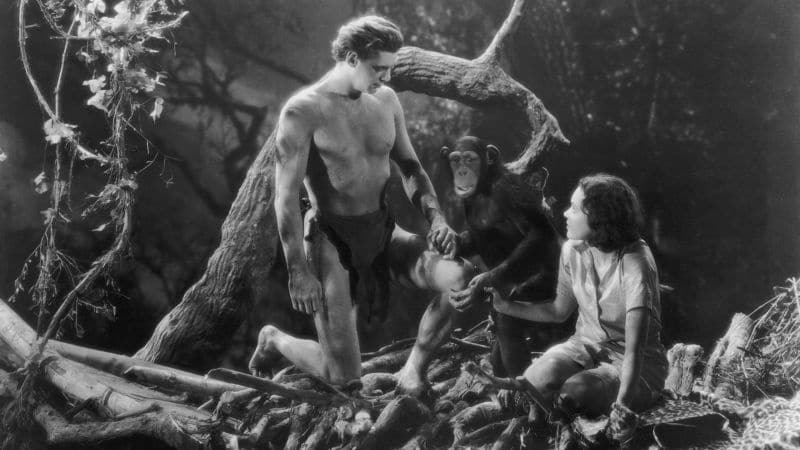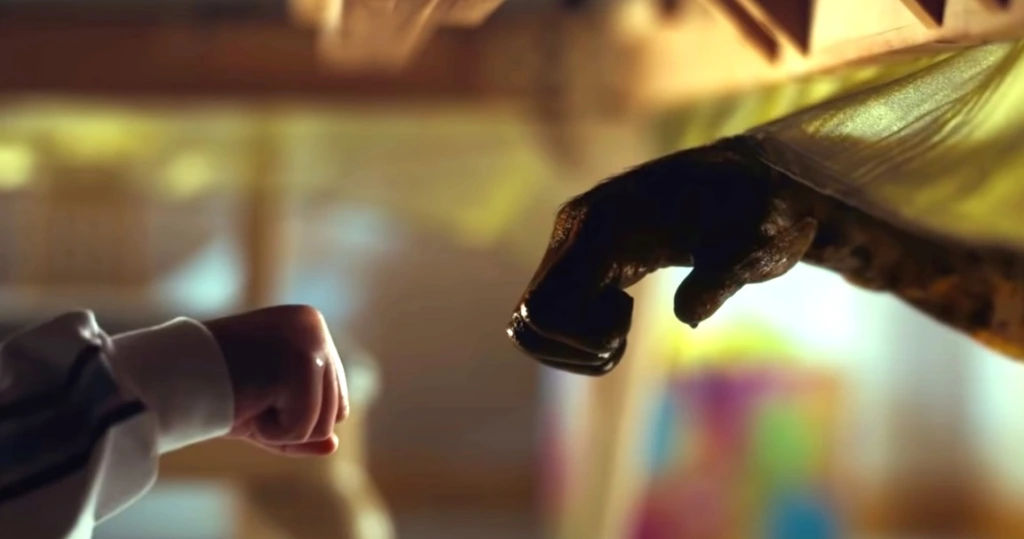A look back at the use of chimpanzees as clowns & sidekicks for humans, & how it relates to a strange & haunting subplot of Jordan Peele’s hit sci-fi horror.
Note: this article contains spoilers for Nope. Please read Jon Negroni’s spoiler-free review here.
If you haven’t seen Nope yet, you might be a little puzzled by references to a character named Gordy, especially once you learn that Gordy is a chimpanzee. It’s understandable: there’s not so much of a glimpse of a chimpanzee in any of the promotional material for Nope, and nothing that happens in its trailers seems to suggest that a chimpanzee will play any part in it.
There’s a brief moment in the film when it seems like Gordy might be some strange comic relief. It’s when horse ranch owner siblings O.J. (Daniel Kaluuya) and Emerald (Keke Palmer) visit their neighbor, Ricky “Jupe” Park (Steven Yeun), a former child actor who now owns Jupiter’s Claim, a tacky Western-themed amusement park. With the family business struggling in recent years, and still grieving the loss of his horse trainer father, O.J. has had no choice but to gradually sell off the horses to Jupe, though he’s determined to buy them back at some point.
O.J. and Jupe’s interactions with each other are cool at best, but with the gregarious Emerald there Jupe is more relaxed. He shows O.J. and Emerald a secret room in his office where he keeps mementos from his time on the 90s sitcom Gordy’s Home, in which a family adopts a chimpanzee, dressing him in clothes and letting him live in their house. Some of Jupe’s choices in mementos are rather morbid, collected in the aftermath of a grisly event in which Gordy, agitated by the sound of popping balloons, attacked and viciously maimed his human co-stars, leaving only a young Jupe unharmed before Gordy is killed.
Now in his thirties, Jupe seems curiously unaffected about the whole thing, even wistful when he talks about the event being lampooned on Saturday Night Live. He tells O.J. and Emerald that the event marked the end of the use of live primates in TV and movies, and that seems to be the last we’ll hear of it, an odd little aside that perhaps just adds dimension to his character.
Gordy is similar to the horrifying true story of Travis, a 13 year-old pet chimpanzee who, in 2009, attacked a friend of his owner, mutilating much of her face and causing massive brain damage. While Travis, acquired through breeders for $50,000 cash and separated from his mother at just three days of age, wasn’t in show business, he was forced to wear clothes, used to promote his owner’s towing company, and even taught how to drive a car. Living entirely on a diet heavy in carbs and fats, he grew morbidly obese. Though Travis’s owner, Sandy Herold, claimed that she had seen no signs of trouble on the horizon, in fact there had been a number of events suggesting that Travis’s behavior was becoming unmanageable. The attack, which ended with Travis shot to death by police while trying to enter a patrol car, was the tragic yet inevitable result of decades of primates being treated not as animals, but as pets, clowns, and surrogate children for people who had no training in primate care, and no respect for their natural instincts.
Rather than studying their remarkable, human-like ability to learn and retain information from a respectful distance and apply it to our own behavior, we turned primates into a spectacle. We put them as sidekicks in movies, forced them to perform in front of an audience, and trained them to act “more” human, mostly because it’s funny to see a monkey doing people things, like wearing a dress, playing the drums and smoking cigarettes. That on its own is an embarrassing reckoning, before we even get to what happens when they don’t cooperate to our liking, or outlive their usefulness.
Beyond the circus (which has its own bleak history we’ve only started learning over the past couple of decades), America’s first exposure to primates as entertainment was likely Cheeta, the chimpanzee co-star of dozens of features and shorts based on Edgar Rice Burroughs’ Tarzan novels. Though there is no Cheeta in the books, he became intrinsically tied to the legend of Tarzan, and nearly two dozen chimpanzees (plus one orangutan) played him over a period of more than fifty years. Incredibly, one of them, named Jiggs IV, is still alive, living his senior years in a Palm Springs primate sanctuary, which is a better outcome than a lot of his peers.

Because for all appearances chimpanzees have playful, almost human-like personalities, they became wildly popular with audiences, appearing in Disney movies, live theatrical revues, Abbott and Costello shorts, The Ed Sullivan Show, the spy parody Lancelot Link: Secret Chimp, 70s TV series B.J. & the Bear, The Cannonball Run and, of course, Bedtime for Bonzo, starring future President Ronald Reagan. When NBC’s Today debuted in 1952, it struggled to find an audience, until a chimp named J. Fred Muggs was brought on board as a sort of honorary co-host, upon which both ratings and advertiser interest significantly improved. J. Fred proved so popular that he was featured in books, games and comics, and even sent to commission Navy ships. In fact, chimps would be a talk show staple, both as guests and in comedy sketches, until well into the 1990s.
The constant demand for chimpanzees and other primates in a pre-Humane Society and PETA era led to poaching and illegal breeding, with baby chimps being separated from their mothers before having a chance to bond (that the mothers were often killed in this process seemed to be of little concern to, say, the producers of The Abbott & Costello Show). Their lively personalities and seeming amenability to being trained made chimps far more popular co-stars than the fearsome looking gorilla, which, when they appeared in movies and on TV, were usually played by actors wearing suits, and were always regarded as wild, unpredictable beasts. This is ironic, when you consider that, in reality, gorillas, while large and very strong, are docile creatures. There have been no known incidents of a gorilla killing a human, and they aren’t known to attack unless they’re provoked.
Chimpanzees, on the other hand, while smaller than gorillas, are also extremely strong, and both can, and will attack unprovoked. Several times stronger than human men, with much of that strength concentrated in their arms, chimps have been known to attack each other, gorillas and humans. They are among nature’s dirty fighters, biting, tearing, gouging and clubbing their opponents into submission. In Uganda, most likely due to farms destroying natural habitats, chimp on human attacks have significantly increased over the past decade, leading to several deaths. Chimpanzees can be cute and funny, but they are also, to put it as bluntly as I can, not to be fucked with.
But because we as humans seem preconditioned to try to dominate anything we perceive as beneath us (even when said thing is capable of tearing us limb from limb), the mass conditioning of chimpanzees to be used as comic relief, store mascots, and family pets continued well into the 21st century. “Training” a chimp to take direction often consisted of physical abuse, withholding food, and terrorizing them so that they bared their teeth in fear – a reaction long misinterpreted as smiling. Occasionally this mistreatment resulted in death, as in the case of Buddha, an orangutan hired to play Clint Eastwood’s horny, beer drinking sidekick Clyde in the best forgotten hillbilly comedy Any Which Way You Can. Buddha was often abused by his trainers, and ultimately beaten to death after misbehaving on set. His crime? Stealing doughnuts from a nearby table. While today such an event would likely get a film production shut down by the Humane Society, in this case Buddha was just quietly replaced by a second orangutan, named C.J. It would seem the warm feeling of “Why, they’re just like us!” only extended to when primates cooperated to human satisfaction.

Because it’s impossible to train and domesticate a chimpanzee over the age of eight, the vast majority of chimp “actors” were very young, if not infant age. Once they aged out (a matter of just a few years), they were “retired,” which, certainly back in the era of Cheeta and J. Fred Muggs, meant (at best) being sold to sketchy roadside zoos or “collectors,” who often forced them to live in cages, spending the rest of their lives trying to adjust to living among other chimps, and struggling with anxiety from the abuse they endured while entertaining humans. Chimpanzees can live up to 70 years. Both the last Cheeta, and J. Fred Muggs, are still alive.
Which brings us back to Nope, and the seemingly random Gordy story, which actually has quite a lot to do with the different ways Jupe and O.J. regard the strange alien being that appears over their homes, hungry for whatever living creatures it can suck up into its enormous mouth. Because Gordy (played via motion capture by Terry Notary) spared Jupe from harm during his on-set attack, and even seemed to have a moment of understanding with him, Jupe believes that they bonded in some way. Now, with this new kind of creature, which seems to know nothing except to eat, and eat, and eat, he wants a second chance to create another bond and a sense of understanding. But Jupe is still, above all else, an entertainer, a showman, and his ultimate goal in this “understanding” is to turn this creature into an event, something to be gawked at by humans.
O.J., on the other hand, has lived among animals his entire life. They’re his life’s work. Now, granted, he works with horses rather than primates, but until such time as they learn to talk it’s impossible to tell what any animal is thinking, as much as many of us would like to think otherwise. He knows that taming a wild animal doesn’t mean you can anticipate its every move. It doesn’t mean you don’t have to respect it and understand that if you’re not careful around it, and if you don’t treat it as if you know it can hurt you, bad things can happen. It’s not an antagonistic relationship, it’s an acknowledgment: I know you’re working purely on instinct, and I’m the one who has to be careful here.
It isn’t surprising who is left standing in the end.
There’s no satisfaction in Jupe’s demise. The dawning expression of “I have made a huge mistake” on his face is sobering rather than comical. It’s probably the same kind of overwhelming fear that, in real life, Travis the chimp’s owner felt when he attacked her friend, and wouldn’t stop, even after she lunged at him with a knife. They probably thought the same thing: What have I done? This isn’t supposed to happen. I’m the human, I’m supposed to be the one in control here.